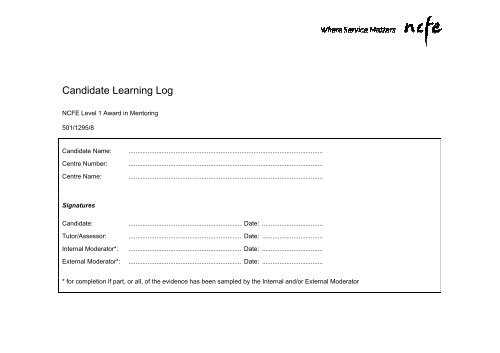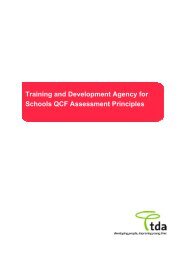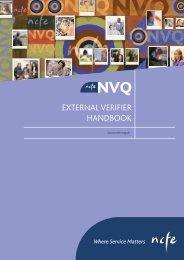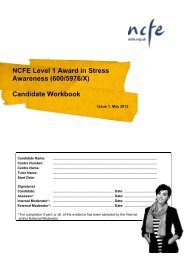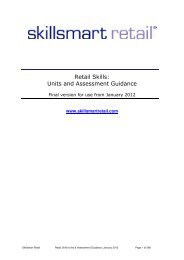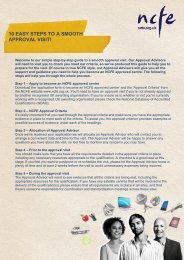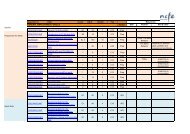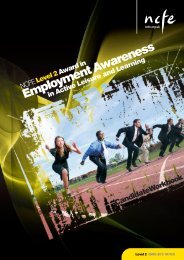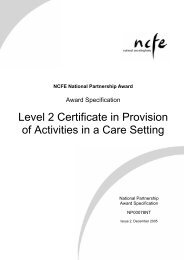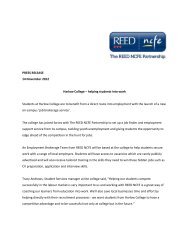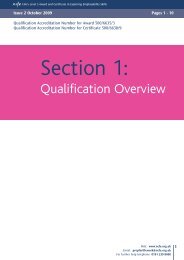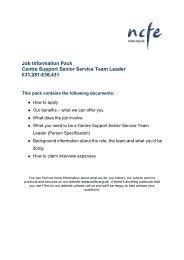Candidate Learning Log - NCFE
Candidate Learning Log - NCFE
Candidate Learning Log - NCFE
You also want an ePaper? Increase the reach of your titles
YUMPU automatically turns print PDFs into web optimized ePapers that Google loves.
<strong>Candidate</strong> <strong>Learning</strong> <strong>Log</strong><br />
<strong>NCFE</strong> Level 1 Award in Mentoring<br />
501/1295/8<br />
<strong>Candidate</strong> Name: ................................................................................................................<br />
Centre Number: ................................................................................................................<br />
Centre Name: ................................................................................................................<br />
Signatures<br />
<strong>Candidate</strong>: ................................................................. Date: ...................................<br />
Tutor/Assessor: ................................................................. Date: ...................................<br />
Internal Moderator*: ................................................................. Date: ...................................<br />
External Moderator*: ................................................................. Date: ...................................<br />
* for completion if part, or all, of the evidence has been sampled by the Internal and/or External Moderator
Contents<br />
Page No.<br />
Section 1: Overview 1<br />
- About this qualification 1<br />
- What you need to cover 1<br />
- Tracking your evidence 2<br />
- How your evidence is checked 2<br />
- How you get your certificate 2<br />
- Opportunities for further education and training 3<br />
Section 2: Planning and tracking your assessment 4<br />
- Completing your learning log 4<br />
- Example unit 5<br />
-<br />
-<br />
Unit 01 Role of a mentor (Level 1)<br />
Unit 02 Role of a mentor (Level 2)<br />
9<br />
13<br />
- Unit 03 Preparing for the role of a mentor 12<br />
- Unit 04 Demonstrating mentoring skills 15<br />
Section 3: Additional information 18<br />
- Additional support requirements 18<br />
- Appeals or complaints 18<br />
- Malpractice 18<br />
About <strong>NCFE</strong> 19<br />
- Enquiries 19<br />
- Equal Opportunities 19<br />
- Data Protection 19
.<br />
Section 1 - Overview<br />
About this qualification<br />
Thank you for choosing an <strong>NCFE</strong> qualification. This learning log is yours to keep and is a place to record your progress.<br />
The <strong>NCFE</strong> Level 1 Award in Mentoring has been accredited by the regulators for England, Wales and Northern Ireland 1 and is part of<br />
the Qualifications and Credit Framework (QCF). Its Qualification Accreditation Number is 501/1298/8.<br />
This qualification has been supported by Lifelong <strong>Learning</strong> UK (LLUK) the Sector Skills Council for the professional development of<br />
those working in career guidance, community learning and development, further education, higher education, libraries, archives and<br />
information services, and work based learning across the UK.<br />
What you need to cover<br />
This qualification is made up of a set of learning outcomes and assessment criteria that describe what you need to be able to do, and<br />
things you need to know to achieve your qualification.<br />
To be awarded the <strong>NCFE</strong> Level 1 Award in Mentoring you must successfully complete one unit from Section A and both units from<br />
Section B.<br />
Section A<br />
Unit 01 Role of a mentor (Level 1)<br />
Unit 02 Role of a mentor (Level 2)<br />
Section B<br />
Unit 03 Preparing for the role of a mentor<br />
Unit 04 Demonstrating mentoring skills<br />
You must provide evidence to show that you meet all the learning outcomes and assessment criteria defined in the units.<br />
1The qualifications regulators (‘regulators’) are Ofqual in England, DCELLS in Wales and CCEA in Northern Ireland.<br />
1
.<br />
Section 1 - Overview<br />
Tracking your evidence<br />
During your course your Tutor/Assessor will ask you to carry out work either in the classroom, in your workplace or at home which<br />
you’ll keep as evidence of your learning.<br />
The work you produce (evidence) will be assessed by your Tutor/Assessor to make sure you’ve covered everything in sufficient<br />
detail. Your evidence could be made up of a combination of:<br />
♦ written work or class notes<br />
♦ products or samples of practical work<br />
♦ case studies<br />
♦ simulated activities or role play<br />
♦ work placement diaries<br />
♦ learning logs<br />
♦ video or audio recordings<br />
♦ other appropriate formats suggested by your Tutor/Assessor<br />
When all of your evidence is gathered together in a file or folder, this becomes your portfolio.<br />
Your centre and Assessor may have systems that they use to plan and monitor your assessment. These may be computer-based<br />
(eg using ‘e-portfolio’ software) or paper-based (using forms or checklists). These systems are designed to show how each piece of<br />
evidence meets which learning outcomes and assessment criteria.<br />
How your evidence is checked<br />
After your Tutor/Assessor has assessed your work, another member of staff - the Internal Moderator - will review it. An External<br />
Moderator from <strong>NCFE</strong> will visit your centre. The External Moderator’s role is to make sure your work has been assessed to <strong>NCFE</strong>’s<br />
requirements. They’ll do this by checking a sample of candidates’ portfolios – which may include yours. They also may wish to talk to<br />
you about the content of the course and the work you’re doing.<br />
How you get your certificate<br />
Once you’ve built up your portfolio of evidence and your Tutor/Assessor and the Internal and External Moderators are satisfied it<br />
meets the standards, you’ll be awarded the <strong>NCFE</strong> Level 1 Award in Mentoring.<br />
2
.<br />
Section 1 - Overview<br />
Your centre will send a signed certificate claim form to <strong>NCFE</strong> when they and the External Moderator have signed off your completed<br />
portfolio. <strong>NCFE</strong> will send your certificate to your centre within 10 working days of us getting this form. Your centre will either forward<br />
the certificate to your home address, or tell you that it’s available for you to collect it.<br />
Opportunities for further education and training<br />
After successfully completing this qualification, you may like to go on to further study in the same or a similar subject. This might<br />
include:<br />
♦ <strong>NCFE</strong> Level 2 Award in Mentoring<br />
♦ <strong>NCFE</strong> Level 2 Award and Certificate in Equality and Diversity<br />
♦ <strong>NCFE</strong> Level 3 Award in Managing Diversity<br />
3
.<br />
Section 2 - Planning and tracking your assessment<br />
Completing your learning log<br />
This section of the log will help you keep track of the work you’ve done and the work you still need to do to finish your portfolio.<br />
It will also help your Tutor/Assessor, Internal and External Moderators find their way around your portfolio so they can assess it or<br />
check it. Your Tutor/Assessor will make sure you’re completing your log correctly.<br />
Overleaf is a sample page similar to those you’ll find in the rest of this log. Use the columns to write down what evidence you’ve put<br />
in your portfolio and to show your Tutor/Assessor and the Internal and External Moderators where it’s located.<br />
You and your Tutor/Assessor and/or an independent witness must sign and date the individual pieces of work in your portfolio. Once<br />
you’ve completed your portfolio, your Tutor/Assessor will sign the front of the log, to show that they’re satisfied you’ve completed it<br />
correctly.<br />
4
.<br />
Section 2 - Planning and tracking your assessment – Example unit – Customer Care<br />
The learning outcomes of the<br />
qualification are shown here.<br />
This column is for the<br />
Internal or External<br />
Moderator to sign if they<br />
sample your portfolio.<br />
The assessment criteria<br />
are listed in this column.<br />
What you’ve done to show this<br />
Portfolio<br />
page<br />
number<br />
Additional<br />
links to<br />
evidence<br />
IM/EM signature if<br />
sampled<br />
You will: Understand customer care<br />
You can:<br />
1.1 Demonstrate effective<br />
‘customer care’<br />
1.2 Identify the benefits of<br />
good customer care<br />
1.3 Describe the effects of<br />
poor customer care<br />
Observation on placement 3 21, 24<br />
Report 2 7<br />
Project 8-11 6<br />
In this column, write<br />
down what evidence<br />
you have put in your<br />
portfolio (eg letter to<br />
client; report).<br />
In this column, write the<br />
location of the evidence<br />
within your portfolio. This<br />
directs your Assessor to<br />
the correct piece of<br />
evidence.<br />
You can complete this<br />
for any additional work<br />
you’d like to use as<br />
evidence<br />
5
.<br />
Unit 01 Role of a mentor (Level 1)<br />
You will: Understand the role of a mentor<br />
What you’ve done to show this<br />
Portfolio<br />
page<br />
number<br />
Additional<br />
links to<br />
evidence<br />
IM/EM signature if<br />
sampled<br />
You can:<br />
1.1 Define the term mentor<br />
1.2 State how mentoring works<br />
1.3 State the advantages and<br />
disadvantages of mentoring for the<br />
mentor<br />
1.4 State the advantages and<br />
disadvantages of mentoring for the<br />
mentee<br />
6
.<br />
Unit 01 Role of a mentor (Level 1)<br />
What you’ve done to show this<br />
Portfolio<br />
page<br />
number<br />
Additional<br />
links to<br />
evidence<br />
You will: Understand the reasons for an agreement between the mentor and the person being mentored<br />
IM/EM signature if<br />
sampled<br />
You can:<br />
2.1 Indicate what is meant by an<br />
agreement between the mentor and<br />
the mentee<br />
2.2 State the difference between an<br />
informal agreement and a formal<br />
agreement<br />
2.3 Identify why it is important to<br />
make an agreement<br />
7
.<br />
Unit 01 Role of a mentor (Level 1)<br />
What you’ve done to show this<br />
You will: Be able to identify support available to a mentor<br />
Portfolio<br />
page<br />
number<br />
Additional<br />
links to<br />
evidence<br />
IM/EM signature if<br />
sampled<br />
You can:<br />
3.1 Identify situations where a<br />
mentor may need to seek support<br />
3.2 Identify the person that the<br />
mentor can directly consult for<br />
support<br />
3.3 State the type of support the<br />
person can provide<br />
3.4 Identify others who can provide<br />
support for a mentor<br />
3.5 State the type of support that<br />
those others can provide<br />
8
.<br />
Unit 02 Role of a mentor (Level 2)<br />
What you’ve done to show this<br />
You will: Understand the role and benefits of mentoring<br />
Portfolio<br />
page<br />
number<br />
Additional<br />
links to<br />
evidence<br />
IM/EM signature if<br />
sampled<br />
You can:<br />
1.1 Outline the role of a mentor<br />
1.2 Describe the term mentee<br />
1.3 Identify different types of<br />
mentoring<br />
1.4 Provide examples of where<br />
mentoring can be used<br />
1.5 Describe the benefits to a<br />
mentor from mentoring<br />
1.6 Describe the benefits to a<br />
mentee from mentoring<br />
1.7 List the potential advantages of<br />
a mentoring scheme<br />
9
.<br />
Unit 02 Role of a mentor (Level 2)<br />
What you’ve done to show this<br />
You will: Be able to identify how a mentoring agreement works<br />
Portfolio<br />
page<br />
number<br />
Additional<br />
links to<br />
evidence<br />
IM/EM signature if<br />
sampled<br />
You can:<br />
2.1 Describe what is meant by an<br />
agreement between the mentor and<br />
the mentee<br />
2.2 Compare informal and formal<br />
agreements<br />
2.3 State the importance of making<br />
an agreement<br />
2.4 Explain why a mentor should<br />
set goals for the mentee<br />
2.5 Describe what an agreement<br />
should cover<br />
2.6 Provide examples showing<br />
when an agreement should come<br />
to an end<br />
10
.<br />
Unit 02 Role of a mentor (Level 2)<br />
What you’ve done to show this<br />
You will: Be aware of how mentors are managed and supported<br />
Portfolio<br />
page<br />
number<br />
Additional<br />
links to<br />
evidence<br />
IM/EM signature if<br />
sampled<br />
You can:<br />
3.1 Describe an appropriate<br />
management structure for<br />
mentoring<br />
3.2 Explain the importance of<br />
having guidelines for the mentoring<br />
process<br />
3.3 Outline how and why mentors<br />
are identified for the role<br />
3.4 Describe the internal sources of<br />
support available to the mentor<br />
3.5 Outline issues that could be<br />
referred to internal sources<br />
3.6 Describe the external sources<br />
of support available to the mentor<br />
3.7 Outline 2 issues that could be<br />
referred to an external source<br />
3.8 Identify the means of securely<br />
storing mentoring documentation<br />
11
.<br />
Unit 03<br />
Preparing for the role of a mentor<br />
You will: Understand key factors relating to mentoring<br />
What you’ve done to show this<br />
Portfolio<br />
page<br />
number<br />
Additional<br />
links to<br />
evidence<br />
IM/EM signature if<br />
sampled<br />
You can:<br />
1.1 Describe what is meant by the<br />
boundaries of a mentor's role<br />
1.2 Identify legislation that is<br />
important in a mentoring role<br />
1.3 State the importance of<br />
personal safety with regard to<br />
mentoring<br />
12
.<br />
Unit 03<br />
Preparing for the role of a mentor<br />
What you’ve done to show this<br />
You will: Be aware of the main tools used by a mentor<br />
Portfolio<br />
page<br />
number<br />
Additional<br />
links to<br />
evidence<br />
IM/EM signature if<br />
sampled<br />
You can:<br />
2.1 State the benefits of good<br />
preparation<br />
2.2 List the documents that a<br />
mentor will use<br />
2.3 Identify types of question that<br />
can be used by a mentor<br />
2.4 Identify how each type of<br />
question can be used<br />
2.5 State the purpose of feedback<br />
2.6 Identify a suitable model for<br />
delivering feedback<br />
2.7 Describe the importance of a<br />
suitable venue for a mentoring<br />
meeting<br />
13
.<br />
Unit 03<br />
Preparing for the role of a mentor<br />
What you’ve done to show this<br />
You will: Understand how to develop the skills to become a mentor<br />
Portfolio<br />
page<br />
number<br />
Additional<br />
links to<br />
evidence<br />
IM/EM signature if<br />
sampled<br />
You can:<br />
3.1 List the personal skills that are<br />
needed to be a mentor<br />
3.2 List the personal skills that you<br />
already possess<br />
3.3 Compare your skills against the<br />
personal skills that are needed to<br />
be a mentor<br />
3.4 Create a personal development<br />
plan, stating how you will:<br />
a) improve the skills you already<br />
have<br />
b) obtain the skills you need<br />
3.5 Create a timeline for the<br />
development of your skills<br />
14
.<br />
Unit 04<br />
Demonstrating mentoring skills<br />
You will: Be able to prepare for a mentoring meeting<br />
What you’ve done to show this<br />
Portfolio<br />
page<br />
number<br />
Additional<br />
links to<br />
evidence<br />
IM/EM signature if<br />
sampled<br />
You can:<br />
1.1 Contact the person to be<br />
mentored and obtain an outline of<br />
the issues for discussion<br />
1.2 Agree and record the time, date<br />
and place of the meeting<br />
1.3 Undertake appropriate research<br />
to ensure you are familiar with the<br />
issues to be discussed<br />
1.4 List all documents to be used<br />
during the meeting<br />
1.5 Prepare all documents for use<br />
during the meeting<br />
15
.<br />
Unit 04<br />
Demonstrating mentoring skills<br />
What you’ve done to show this<br />
You will: Be able to undertake an assessor observed mentoring meeting<br />
Portfolio<br />
page<br />
number<br />
Additional<br />
links to<br />
evidence<br />
IM/EM signature if<br />
sampled<br />
You can:<br />
2.1 Carry out an assessor observed<br />
mentoring meeting<br />
2.2 Create an outline mentoring<br />
agreement<br />
2.3 Respond appropriately to the<br />
needs of the person being<br />
mentored<br />
2.4 Give feedback to the person<br />
being mentored and allow them to<br />
respond<br />
2.5 Complete all necessary<br />
documentation<br />
2.6 Conclude the meeting<br />
appropriately<br />
16
.<br />
Unit 04<br />
Demonstrating mentoring skills<br />
What you’ve done to show this<br />
You will: Be able to review your performance as a mentor<br />
Portfolio<br />
page<br />
number<br />
Additional<br />
links to<br />
evidence<br />
IM/EM signature if<br />
sampled<br />
You can:<br />
3.1 Receive recorded feedback<br />
from the observer about the<br />
mentoring meeting<br />
3.2 Review your own performance<br />
as a mentor<br />
3.3 Prepare a plan to develop your<br />
performance as a mentor<br />
3.4 Outline a timeline for each<br />
development area<br />
17
.<br />
Section 3 - Additional information<br />
<strong>NCFE</strong> is a leading provider of nationally recognised qualifications and is committed to delivering exceptional customer service. We’re<br />
based in Newcastle upon Tyne. If you’d like to know more about us please visit our website at www.ncfe.org.uk.<br />
Additional support requirements<br />
<strong>NCFE</strong> recognises that you might require additional support in order to achieve your qualification. This might be if you’ve a permanent<br />
or temporary disability, medical condition or specific learning need.<br />
Your Tutor/Assessor will discuss the most appropriate method of support to meet your needs and may need to notify <strong>NCFE</strong> of the<br />
support they’re going to give you. This could be facilities to support reading or writing needs, hearing, visual or physical impairment;<br />
facilities to support a medical condition or temporary injury; or facilities to support you if your first language isn’t English.<br />
For more information your Tutor/Assessor will be able to provide you with a full copy of <strong>NCFE</strong>’s Reasonable Adjustments and Special<br />
Considerations Policy, or you can download it from www.ncfe.org.uk.<br />
Appeals or complaints<br />
If you’ve any queries or problems with your qualification you should first talk to your Tutor/Assessor, the Internal Moderator or another<br />
member of staff at your centre. If you’ve got a complaint about the way your work has been assessed, or the support you’ve been<br />
given, use your centre’s own appeals or grievance policy (ask your Tutor/Assessor for a copy).<br />
For more information your Tutor/Assessor will be able to provide you with a full copy of <strong>NCFE</strong>’s Appeals and Enquiries about Results<br />
Policy, or you can download it from www.ncfe.org.uk.<br />
Malpractice<br />
‘Malpractice’ is used to describe something a person does when they intentionally mislead somebody. An example may be copying<br />
somebody else’s work and passing it off as your own. Whenever we’re notified about a suspected or actual case of malpractice, we‘ll<br />
work with the centre to find out if and why malpractice happened and what we can do to sort it out.<br />
If your centre suspects you’ve been involved in malpractice, we won’t be able to issue your certificate during the investigation. If we<br />
prove that malpractice has happened, you may have part of your assessment disallowed or, in serious cases, your final results may<br />
be void. This means you won’t receive a certificate or, if we’ve already issued you one, we’ll ask that you return it straight away.<br />
For more information your Tutor/Assessor will be able to provide you with a full copy of <strong>NCFE</strong>’s Malpractice Policy, or you can<br />
download it from www.ncfe.org.uk.<br />
18
.<br />
About <strong>NCFE</strong><br />
Enquiries<br />
Any enquiries relating to this qualification should be addressed to:<br />
<strong>NCFE</strong><br />
Citygate<br />
St James Boulevard<br />
Newcastle upon Tyne<br />
NE1 4JE<br />
Tel: 0191 239 8000<br />
Fax: 0191 239 8001<br />
E-mail: preforlifework@ncfe.org.uk<br />
Website: www.ncfe.org.uk<br />
Equal Opportunities<br />
<strong>NCFE</strong> fully supports the principle of equal opportunities and opposes all unlawful or unfair discrimination on the grounds of ability,<br />
age, colour, culture, disability, domestic circumstances, employment status, gender, marital status, nationality, political orientation,<br />
racial origin, religious beliefs, sexual orientation and social background.<br />
<strong>NCFE</strong> aims to ensure that equality of opportunity is promoted and that unlawful or unfair discrimination, whether direct or indirect, is<br />
eliminated both in its own employment practices, and in access to its qualifications.<br />
You can download a copy of <strong>NCFE</strong>’s Equal Opportunities Policy from www.ncfe.org.uk.<br />
Data Protection<br />
<strong>NCFE</strong> is registered under the Data Protection Act and committed to maintaining the highest possible standards when handling<br />
personal information.<br />
<strong>NCFE</strong> is a registered charity (Registered Charity No. 1034808) and a company limited by guarantee (Company No. 2896700).<br />
All the material in this publication is copyright.<br />
© <strong>NCFE</strong> Issue 2, October 2010.<br />
All information contained in this publication is correct at the time of printing.<br />
19


